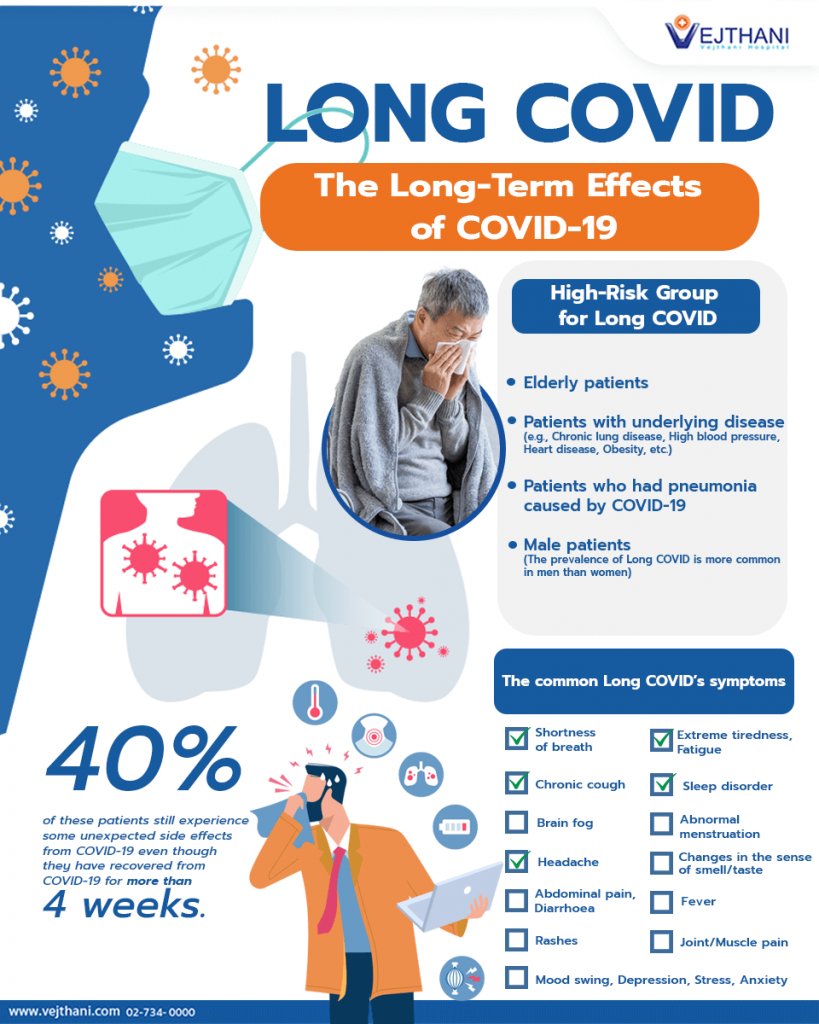

After recovering from COVID-19, most of the patients who have recovered from COVID-19 will gradually be getting better in a few days or weeks and make full recovery. However, 40% of these patients still experience some unexpected side effects from COVID-19 left in their body even though they have recovered from COVID-19 for more than 4 weeks. Long COVID is usually found in the patients who have recovered from severe COVID-19, the patients who had severe pneumonia, and the patients who have multiple underlying diseases. Moreover, Long COVID is more common in men than women, and in the elderly than younger people. Long COVID could affect the quality of life and some of the patients might be unable to spend their lives as usual. The timing and the symptoms of Long COVID could vary in each patient.
The Cause of Long COVID
Currently, the cause of Long COVID and its clear explanation is unknown, as well as the timing of the disease progression is also unclear. However, the results from the inflammation of the inner organs and mental abnormalities that happen after COVID-19 were believed to be the main risk factors for Long COVID.
The Symptoms of Long COVID
There are a number of symptoms the patients can experience. The common Long COVID’s symptoms include:
- Shortness of breath
- Extreme tiredness, Fatigue
- Chronic cough
- Brain fog, Problems with memory and concentration
- Headache
- Abdominal pain, Diarrhoea
- Rashes
- Sleep disorder
- Mood swing, Depression, Stress, Anxiety
- Abnormal menstruation
- Changes in the sense of smell or taste
- Fever
- Joint pain, Muscle pain
High-Risk Group for Long COVID
- Elderly patients
- Patients with underlying disease (e.g., Chronic lung disease, High blood pressure, Heart disease, Obesity, etc.)
- Patients who had pneumonia caused by COVID-19
- Male patients (The prevalence of Long COVID is more common in men than women)
Long COVID Prevention
The best way to prevent Long COVID is to protect yourself from getting a COVID-19 infection. You can protect yourself from getting an infection by getting the vaccination, practice social distancing, avoid getting in the crowded area, wearing a mask, and washing your hands with soap and water, or alcohol-based hand sanitizer.
Long COVID is a silent danger that affects the quality of life of the patients who have recovered from COVID-19. Hence, the patients are recommended to observe their symptoms, take enough sleep, avoid stressful situation, have a healthy diet, and frequently do exercise. If there are abnormalities, seek medical attention as soon as possible because Long COVID can be treated if the patients strictly follow the doctor’s instructions and properly take care of themselves.
- Readers Rating
- Rated 4.5 stars
4.5 / 5 ( Reviewers) - Outstanding
- Your Rating



























